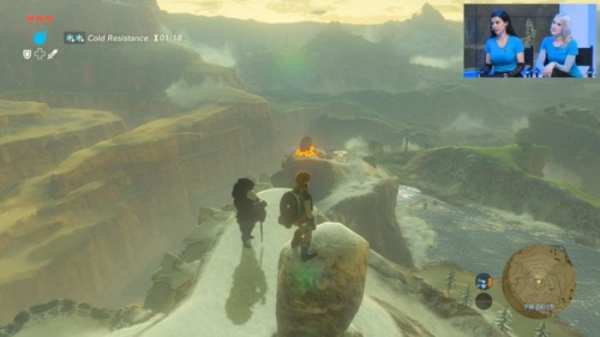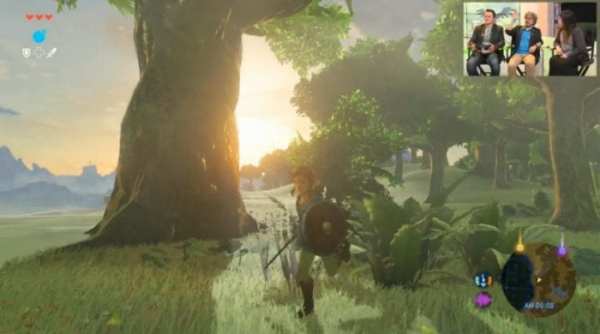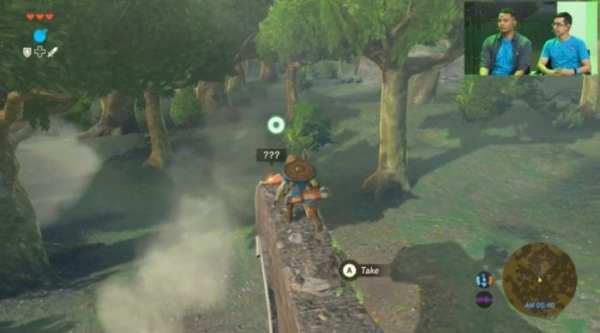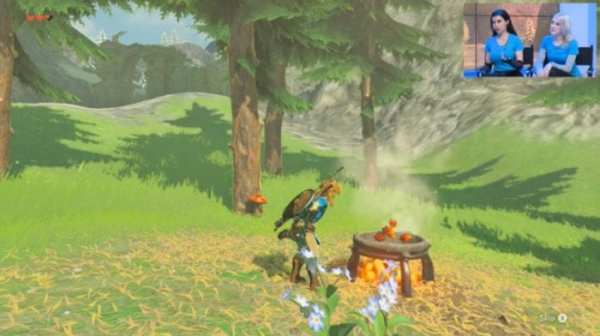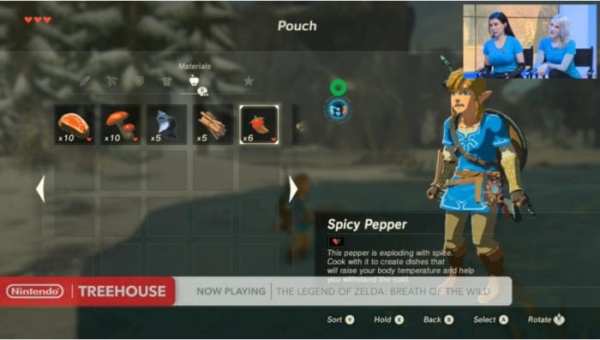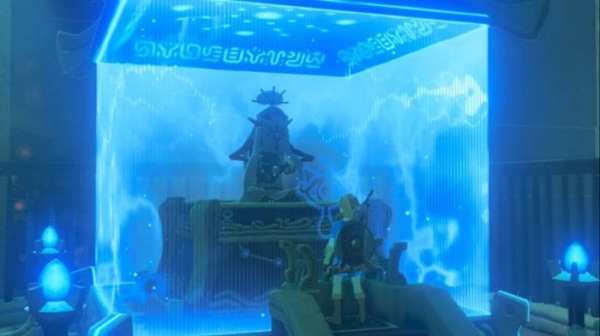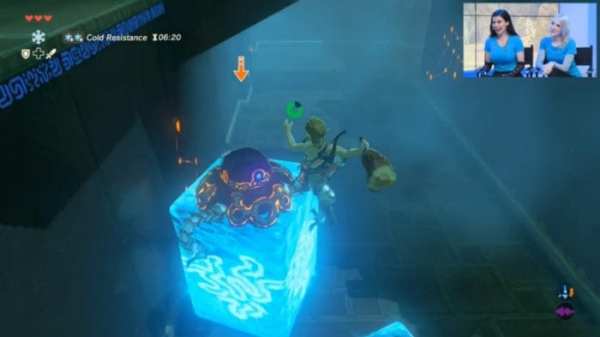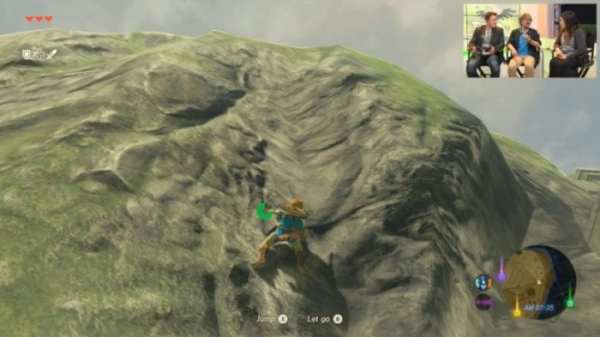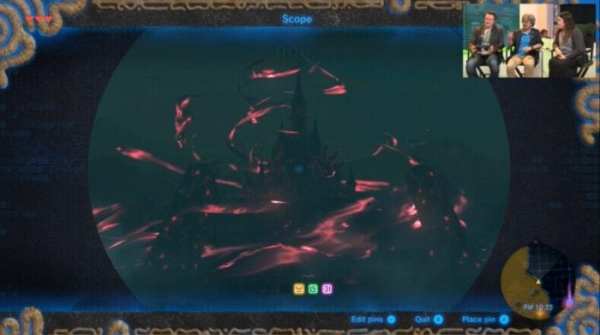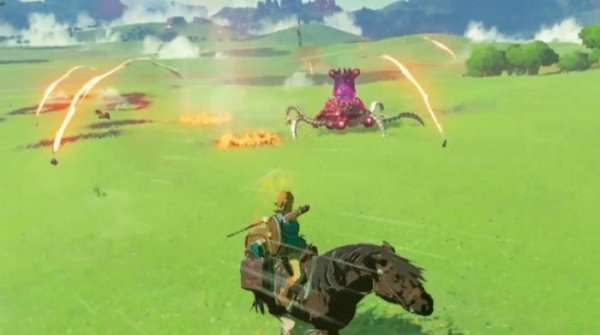Completely Open From The Start
The Legend of Zelda: Breath of the Wild will be completely open to the player from the start of the game. There’s very little in the way of progression gating, so you’ll be able to tackle its dungeons in any order you choose (with what I imagine to be some exceptions, for story reasons). This has never really been done in a big 3D Zelda, but was possible in Link to the Past.
This aspect of the game contributes to a general sentiment that Nintendo wanted to hammer into our heads about Breath of the Wild: this is an open-world game, and that means everything you think it means. There are a myriad of environments that all have different nature, weather, structures, and landscapes. It’s a big game, that much was clear after seeing only a small percentage of the game’s map over six hours.
Weapons & Shields Can Break
Along with a new direction of openness and freedom, Breath of the Wild also seems to be doubling down on its RPG roots. This time around, weapons and shields will degrade over time, so you’ll need to be collecting new swords, axes, and shields from enemies and chests. That also means that the game now has a wider variety of weapons that simply swords; axes are slow but high in damage and great for chopping down trees, swords are fast and reliable, and clubs are great as torches but not so much in combat. You’ll also be finding higher tier weapons over time, so a simple training sword found in the first area will pale in comparison to a weapon dropped by a boss or found later on.
Hunting & Gathering is Key For Survival
The Legend of Zelda: Breath of the Wild has gone full-Far Cry in several ways, just one of which is its hunting and gathering mechanics. Gone are the days of slicing up grass and replenishing Link’s health with easy hearts. Now, survival is the name of the game. Link must hunt down his own food with patience and utilization of stealth. You can set traps for animals (ranging from boar, birds, fish, ferrets, and insects), use tall grass to hide yourself, and even crouch walk around to minimize Link’s sound output (characterized by a meter in the lower right of the screen). Meats, fruits, and vegetables found in the world will all replenish Link’s hearts. This basic change fundamentally shifts the gameplay loop of Zelda from a linear experience to one of emergent action.
Cooking
Yes, this single part of Breath of the Wild deserves its own section. Because simply hunting down animals and veggies won’t cure Link for much. You’ll have to cook what you find to really get the most out of it. The meat roasting over a fire was instantly reminiscent of the Monster Hunter series, right down to Link pulling the seared steak out of the campfire before it was burned too badly. The cooked steak will heal significantly more than a raw one, a difference of three or four hearts in the E3 demo.
But the real star of the show is the cooking pot, a separately placeable item that allows Link to mix different foods together to increase their healing properties, or create something with completely different effects altogether. An example used several times in the demo was the mixing of several vegetables and meat to make a meal that not only healed Link fully, but gave him extra hearts that stick around until he loses them.
Temperature Matters
Cooking also factors into another aspect of Breath of the Wild, temperature. One thing that was very apparent early on in the gameplay is that Link is affected by the temperature of the world around him. We didn’t get to see what the effects of overheating can be, but we got to see a lot of Link in a cold setting. The second he enters a freezing area without the proper protection, his health will slowly start to drop and he’ll begin violently shivering.
This is where you can get creative with cooking. After picking some peppers and other ingredients, you can cook up a spicy drink that will give Link complete cold resistance for a certain time limit (depending on the strength of the drink). This is another clear inspiration from Monster Hunter, and a welcome one at that.
One of the ways Breath of the Wild is breaking away from the series is the ability to equip different pieces of clothing independently, like pants, shirts, coats, and (for just a second we got a glimpse at) different hair styles. This also factors into temperature, as a thick protective shirt will increase cold resistance for Link.
Shrines
Shrines seem to have a big focus in Breath of the Wild. We got a look at three of them today, and each one seems like a small-scale dungeon with puzzles that can be completed in several different ways. Shrines are small structures found throughout the world, and apparently there’s over 100 of them in all. Each one is unique, and completing a set of them will unlock a new tool, like Link’s paraglider.
What was most interesting about the Shrines that we witnessed, was the emphasis on physics-based puzzles. This is the first time a Zelda game has relied on a physics engine (made evident with Link’s ragdolling when he’s caught in an explosion), and the results are pretty great. Shrines are where Link makes the most use of special powers called “Runes,” some examples of which are a stasis power that stops the motion of an item, and a magnet tool that lifts and moves things. Puzzles can be completed in several different ways using runes. One example had the player using the magnet tool to lift a wrecking ball and dropping it on a door to push it open. One person sitting in on the stream was surprised because he hadn’t completed the puzzle that way before.
More Depth in Combat
There are parts of Breath of the Wild that feel inspired by another series that has garnered huge popularity in the five years since the last Zelda game, Dark Souls. This time around, Zelda is going way deeper than mindlessly hacking and slashing with its combat. Enemies have weaknesses that aren’t apparent from the get-go, so the player has to experiment with different types of weapons to optimize their play. This also rings true with Link’s bow, which can shoot a variety of arrows (of which I’d assume we haven’t seen the full extent of yet.) One of the best parts of the combat demonstration was discovering which enemies are weak to fire arrows. We can expect to see a lot more of the combat in the future, and discover even more combat scenarios involving horseback (something we saw only a tease of today).
Climb Anything & Jump
The ability to climb straight up mountains and walls may very well be one of the most important additions to Breath of the Wild. Just as seamlessly as he can sprint, Link can scale up any small incline or cliff wall that would otherwise frustrate the player in the past games. Also important, is the series first time giving the player the simple ability to jump whenever they want.
All of this seems in service Nintendo wanting to give the player ease of movement in the game’s world. They never want the controls or map to get in the way of the player, and nothing communicates this better than Link’s ability to hop onto his shield and surf it down a mountain to bypass the monotony of sliding down. It also seems like the paraglider will be a key item in getting around once unlocked, but they hinted that it would be a much later-game item than we witnessed today.
Mark & Tag Locations/Enemies
Zelda definitely seems to be pulling from multiple inspirations with Breath of the Wild, and another example of this is the game’s Metal Gear-style of marking locations with the Sheikah Slate. Link uses the slate as a scope and can mark locations from extremely far away and view the tags on the map. Nintendo made it a point to emphasize this ability as a way to plan out tasks as you’re exploring the open world. A common example was to climb a high place, see new places in the distance and mark them for later so you can explore them whenever you want.
Arrow/Sword-Time
The biggest surprise we saw today with respect to the game’s combat, was the slow-motion capabilities of Link during sword fights and even with a bow. At some point in combat Link can trigger a flurry attack, which dramatically slows time and lets the player repeatedly slice at the enemy. It’s not entirely clear what makes this happen in melee combat, but we were shown how it works with the bow. When jumping off a cliff and aiming with the bow in mid-air, Link will be able to get a shot off in slow-motion before finishing the fall.
What do you think of The Legend of Zelda; Breath of the Wild? Let us know in the comments, and be sure to stay tuned with Twinfinite for more E3 coverage.

